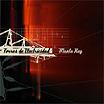Manta Ray "Torres de Electricidad"
 When I was 16, I saw the Spanish group Aina play for about 30 people insomeone’s living room in Washington, DC. It was the first or seconddate on what was to ultimately be their last tour of the States beforedisbanding. While this may seem like a somewhat random way to start offa review for another band, the experience nonetheless left animpression. Aina sounded like one of the best bands I had heard at thatpoint, boasting a full sound literally dripping with jagged hooks andan anthemic quality that recalled Jawbox–how was it they weren’tselling out clubs all over the place?
When I was 16, I saw the Spanish group Aina play for about 30 people insomeone’s living room in Washington, DC. It was the first or seconddate on what was to ultimately be their last tour of the States beforedisbanding. While this may seem like a somewhat random way to start offa review for another band, the experience nonetheless left animpression. Aina sounded like one of the best bands I had heard at thatpoint, boasting a full sound literally dripping with jagged hooks andan anthemic quality that recalled Jawbox–how was it they weren’tselling out clubs all over the place?Acuarela
Whether or not it’s just a fact of life that bands from anywhere notthe United States or the British Isles will have a harder time makingfans outside of their immediate physical surroundings isn’t for me tosay. But what is certain (at least for me) is that for every discoverymade, there are at least three or four groups that continue to toil inrelative obscurity. All of this brings me, in a rather longwinded way,to the subject of Manta Ray’s newest release, Torres de Electricidad.I’m completely unfamiliar with the group's previous output, but what is here is promising.
Opener “Don’t Push Me” begins with what soundslike a hammer repeatedly hitting a piece of sheet metal along withvarious buzzing electronics, while lead singer Jose García intones thetitle like a mantra. The following track, “No Tropieces,” continues thedark early '80s atmosphere of the first song but matches it with jaggedguitar hooks ripped from the band's favorite Don Caballero record andunexpected trumpet blasts. Manta Ray obviously spent a good deal oftime during their formative years digesting mid-'90s indie rock in thevein of Don Cab, Rodan, and Slint, but more interesting is the subtlehints of kraut rock like Can and Neu. This influence can be heard on“No Avant Garde (Elektronik)” and the title track, with its shiftingtime signatures on the former and atmospheric production on the latter.
Manta Ray aren’t rewriting the book here, and tracks like “Por QuéEvadirse A Otros Mundos Aún Más Pequeños” finds the band trying tomellow out their sound with not so great results. Despite missteps likethis, Torres de Electricidad is an album that seethers with intensityand manages to touch on the bands influences without strictly apingthem. The reason for bringing up Aina and contemplating the lot ofbands from other countries is this: were this band American or British,chances are this album would bring them a whole new group of fans.Hopefully, Manta Ray will be able to make a bigger splash in the US.
samples:



